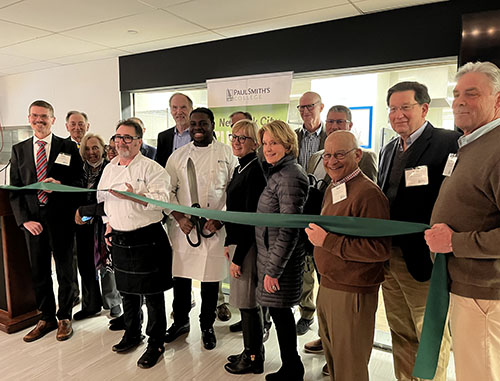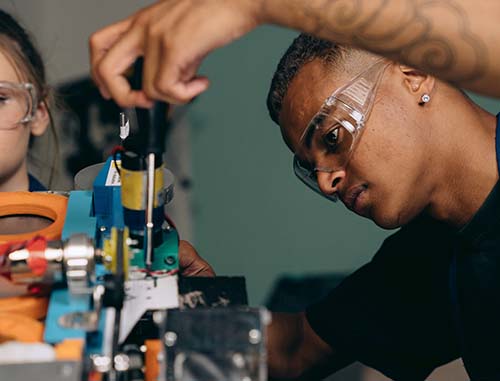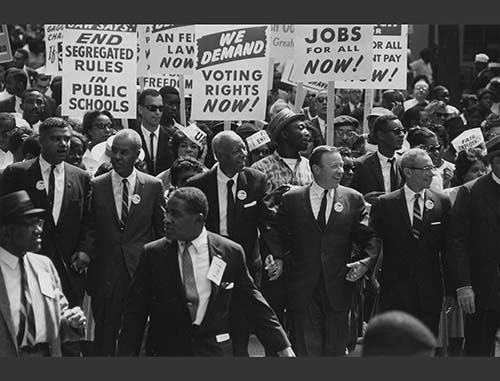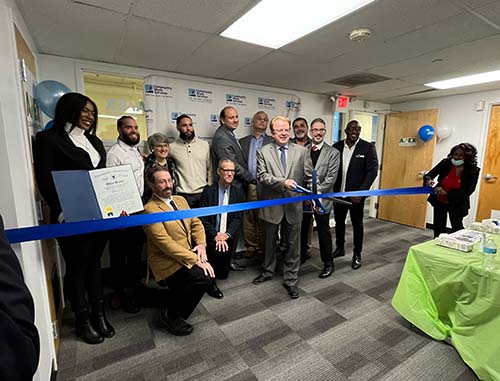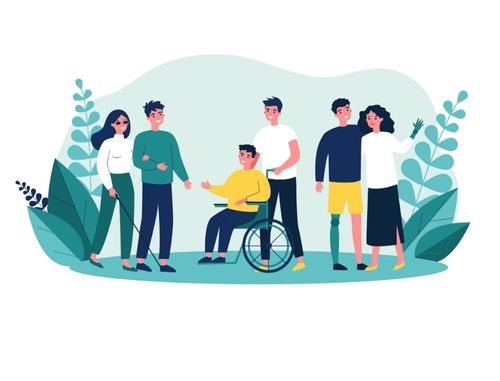02.06.2023
“No hay fuerza más poderosa que un pueblo inmerso en su historia. Y no hay causa más alta que honrar nuestra lucha y a nuestros antepasados; recordándolos.1”
– Lonnie G. Bunch III, Director of the Smithsonian Institution
En 1986, el Congreso aprobó y el presidente promulgó una ley que designaba a Febrero como el Mes de la Historia Nacional de la Raza Negra para observar y participar colectivamente en “ceremonias y actividades apropiadas para homenajear todo lo que los afroamericanos han hecho para ayudar a construir nuestro país”. Es una manera de honrar las contribuciones de los afroamericanos en todas las facetas de la vida. El mes también ayuda a reconocer los desafíos que los afroamericanos han enfrentado, y continúan enfrentando, en nuestro esfuerzo por formar esa unión más perfecta.
El año pasado me enfoqué en cuatro mujeres afroamericanas que cambiaron vidas para las generaciones venideras a través de su tenacidad, su valor y de la voluntad de luchar por la justicia.
Este año, he estado leyendo opiniones de toda una gran gama líderes y pensé que podría ser interesante recopilar extractos de estas opiniones para suscitar tanto el diálogo como la acción.
Las Declaraciones del Presidente Obama hechas por El Mismo en la Bienvenida del Mes de la Historia Negra en 2016:
“El Mes de la Historia Negra no debería se tratada como si fuera de alguna manera separada de nuestra conjunta historia estadounidense, o ser resumida en una recopilación de grandes éxitos. Este mes debería ser algo más que una conmemoración de eventos excepcionales. Sino se trata de la experiencia compartida de todos los estadounidenses de la raza negra, tanto ricos como pobres, famosos y no muy famosos, cuyas vidas han moldeado, desafiado y, en última instancia, fortalecido a los Estados Unidos.
Se trata de echar un vistazo al pasado sin adornos para que podamos crear un futuro mejor. Es un recordatorio de dónde hemos estado como país para que sepamos a dónde tenemos que ir.
Los estadounidenses de la raza negra fueron los esclavizados que extrajeron la piedra para construir la Casa Blanca, fueron los soldados que lucharon por la independencia de nuestra nación, fueron los que lucharon para mantener unida esta unión, los que lucharon por la libertad de otros en todo el mundo. Los estadounidenses de la raza negra son los científicos e inventores que ayudaron a desencadenar la innovación estadounidense. Los estadounidenses negros se apoyan en los hombros no solo de gigantes, sino también de innumerables héroes anónimos que se manifestaron por la igualdad y la justicia para todos nosotros.
Y mientras continuemos así, mientras no nos desanimemos, mientras estemos peleando el buen combate, no solo en un día o un mes, sino diariamente, mensualmente, no tengo ninguna duda de que vamos a cumplir esa promesa.2
Kitty Lundan, una Miembro de la Mesa Directiva del The Palm Beach Post:
“El Mes de la Historia de la Raza Negra nos permite a nosotros y a otras razas aprender sobre la injusticia cometida contra los afroamericanos. El Mes de la Historia de la Raza Negra también les permite a otros aprender sobre la cultura negra. La diversidad, la equidad y la inclusión son ahora los valores fundamentales en los que confían muchas organizaciones. Nos enfocamos en tratar de que todas las personas se sientan incluidas, sin importar la clase de conversación.
¿Cómo pueden los estadounidenses afroamericanos tener conversaciones sobre la historia de la negra con otras razas sin incomodarlos? Si bien no podemos ignorar los hechos horribles que ocurrieron en el pasado y, en algunos casos, todavía están sucediendo, no solo debemos centrarnos en el racismo, sino también en cómo los estadounidenses afroamericanos han contribuido a los Estados Unidos. Educar a otras razas tanto sobre los pioneros negros, como los científicos, los inventores, los educadores, los empresarios, los doctores, así como muchos más con otros títulos además de ser llamados solo negros. Cuando uno se educa a sí mismo desde muchos de estos múltiples ángulos y perspectivas, uno está más preparado para apreciar y beneficiarse de estas diversas conversaciones.”3
La ACLU honró a los Estadounidenses de la Raza Negra que marcaron una diferencia significativa, y esa sección de ese artículo me conmovió:
“Honrando a los líderes en la historia de la raza negra este mes, las batallas que están liderando por los derechos civiles pueden parecer reliquias de una era pasada. Pero hay más progreso por hacer para lograr la igualdad sistémica para los estadounidenses negros, particularmente en el ámbito de los derechos para votar, la justicia económica, la vivienda y la educación; así como poner fin a la brutalidad policial y erradicar el racismo y la discriminación en el sistema jurídico penal. Estas batallas continúan bajo el liderazgo de activistas, legisladores, atletas, actores y otros negros, muchos trabajando codo a codo con la ACLU, que buscan la verdadera igualdad hasta el día de hoy.
Como uno de los principales líderes del movimiento de los derechos civiles, Thurgood Marshall fue el arquitecto de una brillante estrategia legal para poner fin a la segregación y a la lucha contra la injusticia racial en todo el país. Él es más conocido por el caso histórico Brown v. Board of Education de la Corte Suprema de 1954 que desmanteló el precedente de “segregados pero iguales”, iniciando la integración en las escuelas públicas y así como en otras partes de la sociedad. Antes de convertirse en el primer juez negro de la Corte Suprema en 1967, trabajó con la NAACP, fundó The Legal Defense Fund y sirvió en la mesa directiva de la ACLU durante ocho años.
“Donde veas el mal, la desigualdad o la injusticia, opina, porque este es tu país. Esta es tu democracia. Hazlo. Protégelo. Transmítelo.’ — El discurso de graduación en la Universidad de Virginia en 1978″ de Thurgood Marshall.4
Encontré este artículo en el sitio web en the Joint Base San Antonio, que me proporcionó una perspectiva interesante sobre la historia de la raza negra en relación con el ejército. Fue escrito por el coronel George R. Farfour, de Defense Threat Reduction Agency:
“Los estadounidenses afroamericanos acudían para ayudar a su país cada vez que se les llamaba. Desde los cimientos de la independencia hasta las costas de Irak; tanto los soldados, como los marineros, los aviadores, los infantes de marina y los guardianes afroamericanos han demostrado que ellos también tienen un amor feroz de su país y una fortaleza obstinada para triunfar en la batalla. Los estadounidenses afroamericanos están orgullosos de nuestra propia historia de lucha y merecen el lugar que les corresponde en el aprendizaje de esa historia. Desde Crispus Attucks, quien fue asesinado por soldados británicos durante la Masacre de Boston en 1770, hasta los esclavos liberados y fugados de la Guerra Civil, pasando por los soldados Buffalo of Wild West, y hasta el aviador de Tuskegee y llegando hasta hoy; no ha habido escasez de patriotas afroamericanos. Aquí hay remembranzas de solo unos pocos.
El Regimiento de Infantería 369, una unidad afroamericana de la Guardia Nacional de Nueva York conocida como los “Black Rattlers” luchó en la Primera Guerra Mundial bajo el 4º Ejército francés y logró increíbles triunfos en el campo de batalla. A pesar de los obvios prejuicios raciales de la época, ganaron un número impresionante de premios al valor recibiendo más de 171 condecoraciones. Todo el regimiento recibió la prestigiosa Croix de Guerre de Francia. Si bien todavía tenían que viajar en la parte trasera de los autobuses, sus actos heroicos eran tan conocidos que recibieron el honor jamás nunca visto de liderar el desfile de la victoria de la Primera Guerra Mundial de la ciudad de Nueva York. Y los alemanes, reconociendo la asombrosa tenacidad de su enemigo, les pusieron el apodo de “Harlem Hell-fighters”. ‘
La Segunda Guerra Mundial saco a la luz otra ola de distinguidos patriotas afroamericanos. En el USS West Virginia, la suboficial de 3ª clase de la Marina Doris Miller, una cocinera, se levantó temprano el 7 de diciembre de 1941. Mientras servía el desayuno, las explosiones sacudieron el poderoso barco y se dirigió a la cubierta superior. Al ver las llamas, el caos y la muerte, Miller primero ayudó al oficial de mando herido, llevándolo a un lugar seguro. Luego tomó el control de una estación de una de las muchas ametralladoras sin usar y comenzó a disparar. Aunque fue entrenado solo como cocinero y sin instrucción en el uso del arma automática, Miller derribó dos aviones japoneses antes de que cesaran los ataques. Nunca abandonó su puesto durante las horas del ataque, un puesto que asumió por necesidad. El comandante de Pacific Fleet, el almirante de la Marina Chester Nimitz, entregó personalmente a Miller la Navy Cross, un remio al valor solo superado por de Medal of Honor.
El General de la Brigada Charles McGhee, también nos da una lección imperecedera de fortaleza para la misión. Después de interminables intentos de minimizar sus habilidades, los aviadores de Tuskegee finalmente fueron enviados a combatir con una sola misión: escoltar y proteger a bombarderos de los bombardeos de la ofensiva alemana. Cuando se le preguntó por qué nunca se había convertido en una estrella, derribando 5 o más aviones enemigos, dijo: “convertirse en una estrella nunca fue más importante que proteger a los bombarderos. En otras palabras, la misión era más importante que la fama personal. Y se convirtieron en legendarios por su compromiso con la misión y, como resultado final, con nuestro país.
Vietnam vio al soldado Milton Olive III, de 18 años, recibir de Medal of Honor por un acto de valentía que pocas personas en una guerra han igualado. La unidad de Olive estaba bajo fuertes ataques enemigos del Viet Cong. Mientras el enemigo huía de los contraataques del 3er Pelotón del soldado Olive, algunos Viet Cong se volvieron y lanzaron granadas, una de las cuales cayó cerca de Olive, y de tres de sus amigos y del líder del pelotón. Olive agarró la granada y la cubrió con su cuerpo, absorbiendo la explosión y salvando a sus compatriotas, mientras aseguraba el éxito del contraataque. En la ceremonia de la Casa Blanca para presentar de Medal of Honor póstumamente a los padres de Olive, el presidente Johnson evoco la razón por la que debemos recordar el ejemplo de Olive y de otros como él: “Al morir, nos enseñó a aquellos de nosotros que quedamos cómo debemos vivir.’ 5
****
No hay escasez de grandes estadounidenses de la raza negra para honrar. Honrémoslos con medidas y progreso. Si bien se han logrado avances gracias a estas personas, todavía queda mucho trabajo por hacer.
La misión del Fedcap Group es proporcionar bienestar económico a las personas; sin embargo, demasiados datos ilustran las disparidades raciales de la economía en curso. Como se encontró en el reciente informe de Bureau of Labor Statistics; la tasa de desempleo entre los estadounidenses negros (5.4%) es más alta que el promedio nacional (3.4%) y la de los blancos (3.1%). Otro informe reciente del Brookings Institute encontró una creciente diferencia de empleo racial, especialmente para las mujeres de color. Debemos ser incansables en nuestro esfuerzo por limitar estas diferencias.
La historia de nuestro país solo se enriquece al recordar a las diversas personas que ayudaron a darle forma. El Mes de la Historia de la Raza Negra ayuda a crear conciencia y conocimiento de las experiencias vividas por los estadounidenses afroamericanos y cómo podemos participar en un diálogo real sobre la justicia racial, social y económica para lograr un cambio significativo. Las palabras sabias anteriores pueden servirnos como nuestro “Verdadero Norte” en la búsqueda de ese objetivo.
